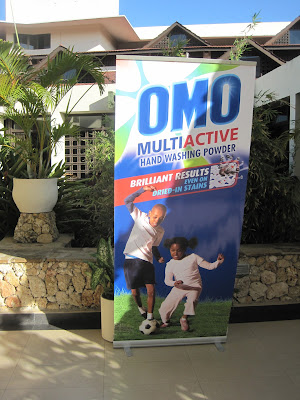A US teacher friend of mine suggested that my African friends might be better equipped for life (survival) than the rest of us who luxuriate here in the western world. Interesting thought. Any idea how well you'd do in similar circumstances?
For perhaps most people in the world, building a house is something they do themselves, maybe as a family project. How many of us could do as well?
Here, dad oversees the construction project his daughter and new husband have undertaken; a simple house on the lot next to his. They buy materials as they can afford them and hand-carry them to the site.
 Simple chores like laundry are handled as needed; perhaps at the
nearest river, if there is one.
Simple chores like laundry are handled as needed; perhaps at the
nearest river, if there is one.Dishes and cooking utensils often travel the same route, or are washed at home with water they carried there for the purpose. Here, the youngest sister has dish duty today. She almost smiled for the camera.













